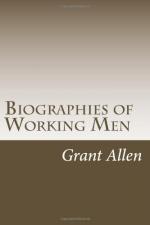At the end of two years, however, the brothers heard that better wages were being given, a couple of miles away, at Grandholm, up the river Don. So off the lads tramped, one fast-day (a recognized Scotch institution), to ask the manager of the Grandholm factory if he could give them employment. They told nobody of their intention, but trudged away on their own account; and when they came back and told their parents what they had done, the father was not very well satisfied with the proposal, because he thought it too far for so small a boy as Tam to walk every day to and from his work. Tam, however, was very anxious to go, not only on account of the increased wages, but also (though this was a secret) because of the beautiful woods and crags round Grandholm, through which he hoped to wander during the short dinner hour. In the end, John Edward gave way, and the boys were allowed to follow their own fancy in going to the new factory.
It was very hard work; the hours were from six in the morning till eight at night, for there was no Factory Act then to guard the interest of helpless children; so the boys had to be up at four in the morning, and were seldom home again till nine at night. In winter, the snow lies long and deep on those chilly Aberdeenshire roads, and the east winds from the German Ocean blow cold and cutting up the narrow valley of the Don; and it was dreary work toiling along them in the dark of morning or of night in bleak and cheerless December weather. Still, Tam liked it on the whole extremely well. His wages were now three shillings a week; and then, twice a day in summer, there was the beautiful walk to and fro along the leafy high-road. “People may say of factories what they please,” Edward wrote much later, “but I liked this factory. It was a happy time for me whilst I remained there. The woods were easy of access during our meal-hours. What lots of nests! What insects, wild flowers, and plants, the like of which I had never seen before.” The boy revelled in the beauty of the birds and beasts he saw here, and he retained a delightful recollection of them throughout his whole after life.
This happy time, however, was not to last for ever. When young Edward was eleven years old, his father took him away from Grandholm, and apprenticed him to a working shoemaker. The apprenticeship was to go on for six years; the wages to begin at eighteen-pence a week; and the hours, too sadly long, to be from six in the morning till nine at night. Tam’s master, one Charles Begg, was a drunken London workman, who had wandered gradually north; a good shoemaker, but a quarrelsome, rowdy fellow, loving nothing on earth so much as a round with his fists on the slightest provocation. From this unpromising teacher, Edward took his first lessons in the useful art of shoemaking; and though he learned fast—for he was not slothful in business—he would have learned faster, no doubt, but for his employer’s very




